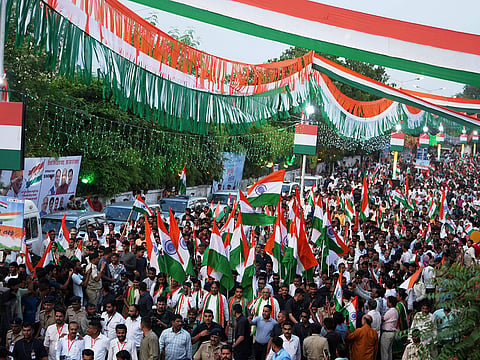India’s true strength lies in the power of every vote
Right to vote is a weapon that unites, holds leaders accountable, keeps democracy alive

India’s tryst with destiny, in our first Prime Minister Jawaharlal Nehru’s immortal words, would have been in no small measure incomplete without universal adult franchise — the right to vote of every single Indian citizen from the day India became free.
This, our version of an abiding covenant with our nation, distinguishes India both in the neighbourhood and in the wider world as the largest democracy. It gives us hope that we can change a situation we don’t like.
Remember how enlightened this was for the times, when women across the world — in countries described as the “mother of democracies” (actually Athens), and a phrase used both by the United Kingdom (“mother of Parliaments”) and the United States — had to struggle for nearly centuries to get the equal right to vote alongside men.
Consider these:
United States: The 19th Amendment to the US Constitution was proclaimed on August 26, 1920, formally enfranchising women on an equal basis with men.
United Kingdom: 1918 - The Representation of the People Act granted voting rights to women over 30 who met certain property requirements.
1928: The Equal Franchise Act extended the right to vote to all women over the age of 21, placing them on the same voting terms as men.
No discrimination
The leaders who fought for our independence — Mahatma Gandhi, Jawaharlal Nehru, Sardar Patel, Maulana Azad — and women like Annie Besant had no idea of discrimination in their minds about the equal status of men and women. Gandhi and Nehru, in particular, wanted women to be equal partners in the fight for independence against colonial rule. It was taken for granted that women who had also suffered and fought for independence would get the equal right to vote when independence came and India became a democracy.
This was at a time when doomsayers and naysayers were doing a negative countdown to the very survival of India as a democracy. Indian democracy was repeatedly written off with near-racist tropes of how the “natives would have no idea how to govern themselves” and that “democracy was a foreign plant on stony soil which would die at the very roots.” We should take huge satisfaction in having emphatically proved the world wrong. Except for the dark period of the Indira Gandhi-imposed Emergency, Indian democracy has shown how deeply rooted it is in our soil.
Power of the vote
Every single citizen — from Bihar, Uttar Pradesh and the North-East to the South — has shown how much the right to vote, to change our own fortunes, means to every Indian. The one thing that truly unites us in a country where the dialect changes every couple of miles, as it does in my Uttar Pradesh, is a people proud of their right to vote — literate or illiterate, rich or poor. Every Indian citizen knows instinctively the power they hold when they press the button on the electronic voting machine. It is the power to hold the powerful accountable for the decisions they have taken in their name. It is the power to demand an account of governance — and to punish leaders if not satisfied.
Let me tell you a story. A powerful Bihar politician in the first BJP government led by Atal Behari Vajpayee was elected from a Lok Sabha seat in the remote reaches of Bihar. He was given a powerful ministry and, as is a politician’s proclivity, grew smug and arrogant. His constituents would make frantic calls — there would be no response. None of his election promises to develop the constituency were fulfilled. His wife let it be known that she bathed with mineral water during their rare visits to the seat. Every time constituents demanded solutions, he would loftily say, “fax my office.”
Come re-election time, the politician begged Vajpayee to allow him to change his seat. Vajpayee refused. The politician went canvassing, and the long-suffering, angry Bihari voter told him loudly and sarcastically, “don’t come here, we will fax our vote to you.”
The leader has never been elected to Parliament again. I can think of several Lok Sabha MPs, including film actors, who will face the same fate if they dare contest next time.
So the citizen knows that the right to vote is his Brahmastra (ultimate weapon). This is why the Election Commission is facing close scrutiny and forensic examination of its voter lists and the deletion of millions of voters in Bihar. Make no mistake — and neither should the Election Commission and the government — this is an issue of paramount importance to every citizen, a right zealously guarded.
On Independence Day, we do deserve a pat on the back for cherishing our democracy and our universal franchise.
Sign up for the Daily Briefing
Get the latest news and updates straight to your inbox







